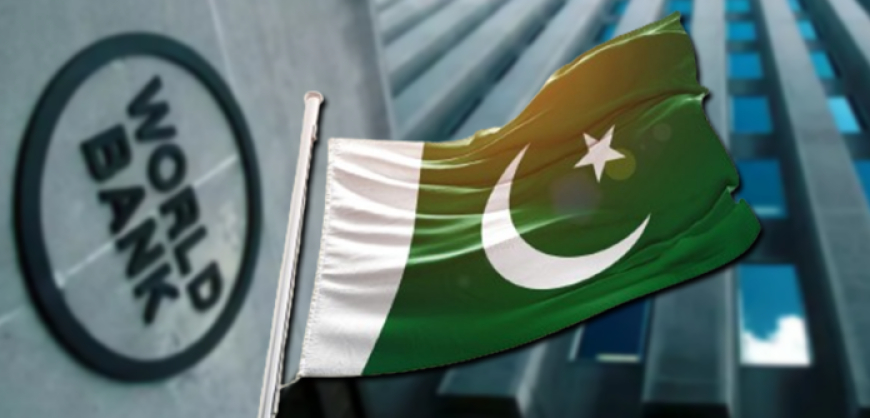World Bank to Invest $40 billion in Pakistan
In a historic move, the World Bank has announced a substantial $40 billion investment plan for Pakistan over the next few years. This financial support aims to strengthen Pakistan’s economy, combat poverty, enhance infrastructure, and promote sustainable development. The announcement has sparked hope across various sectors, from energy and education to agriculture and digital transformation.

In a historic move, the World Bank has announced a substantial $40 billion investment plan for Pakistan over the next few years. This financial support aims to strengthen Pakistan’s economy, combat poverty, enhance infrastructure, and promote sustainable development. The announcement has sparked hope across various sectors, from energy and education to agriculture and digital transformation.
-
$40 Billion Investment planned by the World Bank for Pakistan.
-
Investment spread over 10 years, supporting long-term development.
-
Focus areas include energy, agriculture, water management, education, health, climate resilience, and digital economy.
-
Aimed at reducing poverty, increasing employment, and promoting sustainable growth.
-
Strong collaboration between the Government of Pakistan and World Bank leadership.
-
Potential to make Pakistan a regional hub for trade, tech, and clean energy.
This $40 billion investment is more than just financial aid. It’s a comprehensive development partnership. Here's what it means for the nation:
-
The injection of funds will stimulate economic growth, particularly in struggling sectors like energy, agriculture, and manufacturing.
-
Improved infrastructure will boost local industries and attract foreign direct investment (FDI).
-
Funds will target low-income and underserved communities, with special programs in rural and underdeveloped areas.
-
Investment in education, healthcare, and housing will uplift living standards.
-
Major employment opportunities will arise through construction, IT, agriculture, and clean energy projects.
-
Training and skills development programs will prepare youth for the digital and green economy.
-
Expansion of clean and renewable energy projects like solar and wind.
-
Upgradation of power transmission systems to reduce load shedding.
-
Focus on affordable and sustainable electricity for both urban and rural areas.
-
Modernization of irrigation systems and farming techniques.
-
Support for climate-smart agriculture to tackle changing weather patterns.
-
Boost in crop yield and export potential.
-
Investment in broadband infrastructure and digital transformation of government services.
-
Promotion of tech startups, innovation hubs, and e-governance tools.
-
Empowerment of youth through digital literacy programs.
-
Clean water access for millions through advanced purification and supply projects.
-
Dams, reservoirs, and water conservation infrastructure to protect against future droughts.
-
Better flood management systems in flood-prone regions.
-
Building and upgrading hospitals, especially in rural areas.
-
Initiatives to reduce child mortality and maternal health issues.
-
Improving school infrastructure, teacher training, and access to quality education.

The World Bank is also focused on climate change adaptation in Pakistan. This includes:
-
Reforestation and green energy projects.
-
Resilient infrastructure in areas affected by floods or earthquakes.
-
Programs to reduce carbon emissions and promote sustainable practices.
The Government of Pakistan, under the leadership of the Prime Minister and the Finance Ministry, has welcomed the initiative with full support:
-
High-level meetings between World Bank officials and Pakistani ministers.
-
Agreement on transparent fund utilization and tracking progress through data dashboards.
-
Reforms in governance, taxation, and regulatory frameworks are needed to ensure successful execution.
“This is a golden opportunity for Pakistan to not just recover, but rise. The $40 billion will lay the foundation for a self-reliant and future-ready economy.” — Dr. Salman Shah, Economist.
“If utilized with transparency and vision, this can change the fate of Pakistan’s poor communities.” — Mahreen Malik, Development Consultant.
Despite the positive news, there are some challenges Pakistan must address to fully benefit from this investment:
-
Corruption and fund misuse must be avoided through strict monitoring.
-
Timely project completion is essential.
-
Political stability and policy consistency are crucial.
-
The private sector must be involved in innovation and job creation.
The $40 billion World Bank investment in Pakistan marks a turning point in the country's economic journey. It provides the resources and backing needed to tackle longstanding issues, from energy shortages to poverty and unemployment. But for this dream to become a reality, transparency, dedication, and strategic planning are key.

 Ateeq Ur Rehman
Ateeq Ur Rehman